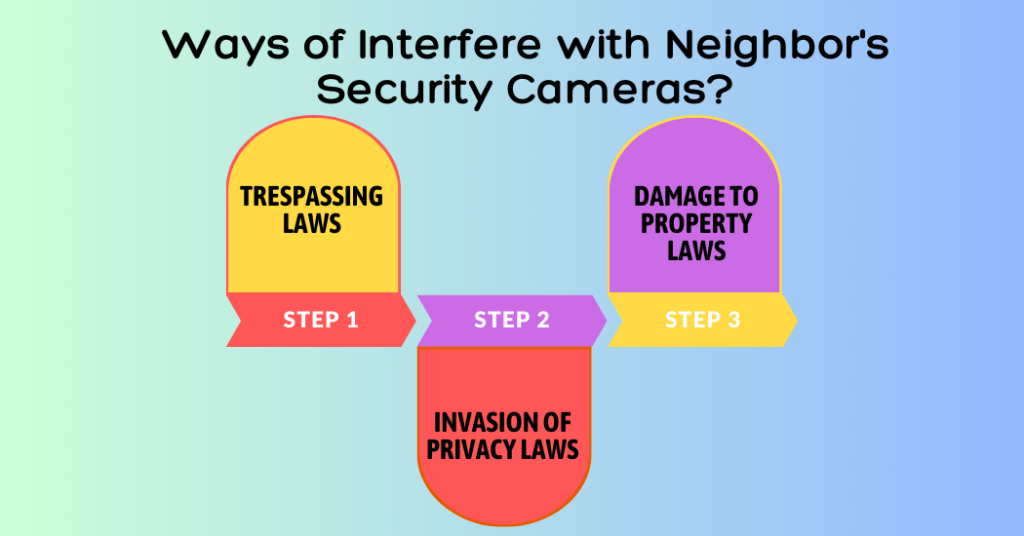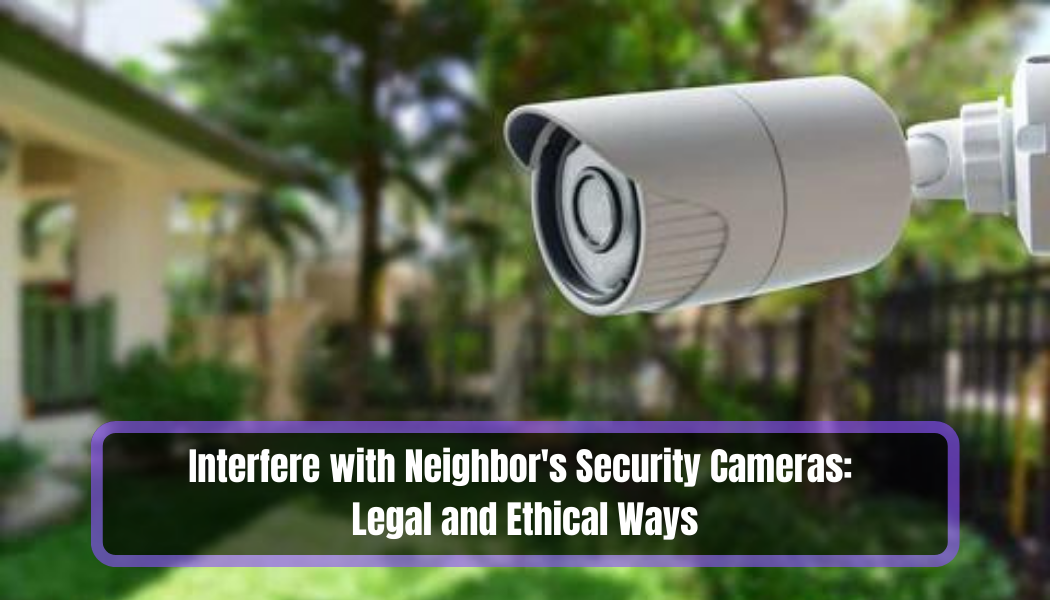Security cameras are common now because technology is everywhere in our lives. The watchful guards protect homes, belongings, and loved ones.
Homeowners feel safe with them. However, if these cameras can see beyond property borders. People worry about privacy and the law. Is it legal to interfere with your neighbor’s security cameras?
We study how our actions affect the law, ethics, and relationships in a connected world. In this exploration, we will study security camera laws and discuss interference consequences. We will also consider ethical considerations to understand this evolving issue.
Contents
- 1 Understanding The Legality of Security Cameras
- 2 Is it Legal to Interfere with Neighbor’s Security Cameras?
- 3 Alternatives to Interfere with Neighbor’s Security Cameras
- 4 Consequences of Illegal Interfere with Neighbor’s Security Cameras
- 5 Interfere with Neighbor’s Security Cameras Ethical Considerations
- 6 Conclusion
Understanding The Legality of Security Cameras
Let’s first see if it’s okay to tamper with your neighbor’s security cameras. Property owners in many areas can put up security cameras on their property.
These cameras serve as a tool to protect their property, belongings, and loved ones. Local and state laws control security camera installation to protect people’s privacy rights.
Although security cameras can invade privacy if not placed correctly. They help prevent crime and gather evidence in security issues or arguments.
Is it Legal to Interfere with Neighbor’s Security Cameras?

Messing with your neighbor’s security cameras is a tricky legal matter. It’s important to grasp the different parts and possible outcomes of these actions.
1. Trespassing Laws:
Trespassing laws are a main legal issue when it comes to security cameras. Entering your neighbor’s property without permission and messing with their cameras is trespassing. Trespassing is illegal in many places. It goes against the owner’s control of their land. If you go onto your neighbor’s land without asking, you could face legal trouble, even if you want privacy.
2. Invasion of Privacy Laws:
Tampering with security cameras can also raise concerns related to invasion of privacy. Do not invade your neighbor’s privacy. Do not tamper with their cameras or windows. Privacy laws differ by location, but their main aim is to protect people’s privacy at home. Therefore, tampering with cameras capturing such private areas can result in legal consequences.
3. Damage to Property Laws:
Breaking or disabling security cameras can also lead to serious legal consequences. If you break someone’s stuff on purpose, you might get in trouble with the law or have to pay for fixing or replacing it. Tampering with security cameras is against the law, even if you think it’s for privacy.
It's against the law to mess with someone's stuff or invade their privacy, even if it's by accident. It's important to keep your privacy safe. You can address concerns legally, without breaking any laws.
If you have concerns about your neighbor’s security cameras, it’s advisable to:
- Start a polite conversation with your neighbor to talk about your privacy worries.
- To solve privacy problems, try changing camera angles or recording times.
- Before setting up your camera, be sure to review the laws protecting privacy in your area.
We can handle privacy, follow the law, and be friendly with our neighbors.
Alternatives to Interfere with Neighbor’s Security Cameras
If you worry about your neighbor’s security cameras. find ways to keep your privacy and their security safe. Instead of resorting to illegal interference, consider the following alternatives:
1. Open Communication:
Talking to your neighbor is usually the best way to solve privacy issues. Express your feelings and discuss how the cameras impact your sense of privacy. It’s important to talk openly with your neighbor to find a solution that benefits both of you. They might not realize they are intruding.
2. Compromise:
Work together with your neighbor to find compromises. That balance their need for security and your rights to privacy. To reach a compromise, we could change camera angles or add privacy features.
3. Adjust Camera Angles:
You can talk to your neighbor about camera angles to make sure they don’t film private spaces. This way, the cameras will mainly focus on their property and public areas.
4. Privacy Screens:
Privacy screens or barriers on your property can be an effective way to block the view of the cameras. To maintain privacy and respect your neighbor’s security concerns, you can use physical barriers.
5. Scheduled Recording:
Proposing specific camera recording schedules can minimize intrusions during your private moments. For instance, the cameras can be set to record only during nighttime or when you are away from home.
6. Privacy Zones:
Some modern security cameras offer the feature of creating privacy zones. You and your neighbor can choose areas where the camera won’t film to keep your privacy safe.
7. Local Regulations:
Make sure to look up the rules about where your neighbor can put their cameras.
8. Mediation Services:
In cases where disputes persist, consider involving mediation services. A mediator can help you and your neighbor have a good conversation to find a solution that respects both of you.
Remember that open communication and compromise are often the most effective ways to resolve privacy concerns related to security cameras without resorting to illegal interference.
Consequences of Illegal Interfere with Neighbor’s Security Cameras
Interfering with your neighbor’s security cameras can have serious legal and social consequences. It’s important to be aware of the potential outcomes of such actions:
| Consequence | Description |
|---|---|
| Fines and Penalties | Engaging in illegal interference can lead to fines and penalties imposed by law enforcement or the courts. Depending on the severity of the interference, these fines can be substantial. |
| Criminal Charges | In some cases, illegal interference may result in criminal charges, such as vandalism, trespassing, or invasion of privacy. Convictions can lead to a criminal record and potential incarceration. |
| Civil Lawsuits | Your neighbor may choose to file a civil lawsuit against you for damages related to the interference. This can include the cost of repairs or replacements for the damaged equipment and potential compensation for emotional distress. |
| Strained Relationships | Interfering with your neighbor’s security cameras can strain neighborly relationships and create hostility. It can lead to a breakdown in trust and make daily interactions uncomfortable. |
| Hostile Living Environment | A hostile living environment can result from ongoing disputes over security cameras. This can negatively impact your quality of life and well-being, as well as that of your neighbors. |
If you tamper with your neighbor's security cameras, there will be serious consequences. It can affect your life and relationships for a long time. To prevent issues, handle privacy concerns and conflicts with neighbors fairly and legally. To have a peaceful home, it's important to talk, compromise, and follow the rules.
Interfere with Neighbor’s Security Cameras Ethical Considerations
When discussing security cameras and privacy, it’s crucial to think beyond the law. We should also think about the ethics of the matter. Technology has transformed our lives and challenged traditional notions of privacy. As responsible community members, we should think about ethics when using security cameras.
1. Respect for Privacy:
Respecting the privacy of others is a fundamental ethical principle. We should protect our privacy and also respect our neighbors’ privacy rights. Security cameras are used for personal safety, but shouldn’t invade others’ privacy. Consider whether interfering with your neighbor’s security measures respects their right to privacy.
2. Balancing Security and Privacy:
Ethical decision-making involves striking a balance between security and privacy. People have valid security concerns, so they use security cameras. At the same time, we must be mindful of the potential intrusion into the private lives of those around us. Ethical solutions should strive for security and privacy without sacrificing either one.
3. Maintaining Positive Relationships:
Breaking your neighbor’s security cameras can damage your relationship and upset the community. Being ethical involves having positive relationships with neighbors and collaborating to solve issues. In the long run, it’s better to build trust and community than to interfere with privacy issues.
4. Transparency and Consent:
To use security cameras ethically, you need to get permission from anyone you might film. Instead of secretly getting involved, openly talk to your neighbor about their cameras.
5. Technological Responsibility:
As technology users, we have a responsibility to use it responsibly and ethically. This includes respecting the boundaries of others when using surveillance technology. It’s important to think about how our actions affect our neighbors and communities. This is part of being responsible with technology.
6. Long-Term Solutions:
Consider the long-term consequences of your actions. If you want more privacy, it might seem tempting to mess with your neighbor’s security cameras. However, it can cause ongoing conflicts and legal problems. Ethical solutions aim for sustainable, harmonious relationships within the community.
Conclusion
To summarize, you can’t tamper with your neighbor’s security cameras. It has serious consequences. Instead of doing things on your own, talk openly and respectfully with your neighbors. To create a peaceful place to live. Work together and find fair solutions that respect everyone’s rights.
In order to deal with these situations, you should try to understand and care about others. Be willing to find a compromise and follow the law. To make your neighborhood safer and more harmonious, promote understanding and cooperation.
Additional Resources
To learn about security camera laws and privacy, check out these resources:
Also read our another blog post on neighbor’s security camera:
- Neighbor’s Security Camera Interference: Protect Your Privacy!
- Neighbors Security Cameras Trained On Your House – Guardians of Privacy!
- Can I Install Cameras In My Condo
- What to Do If Neighbor’s Security Camera is Invading My Privacy?
- Should Security Cameras be Visible – Simple Guide
- Can I Disable My Neighbor’s Security Camera: Know Your Rights!


